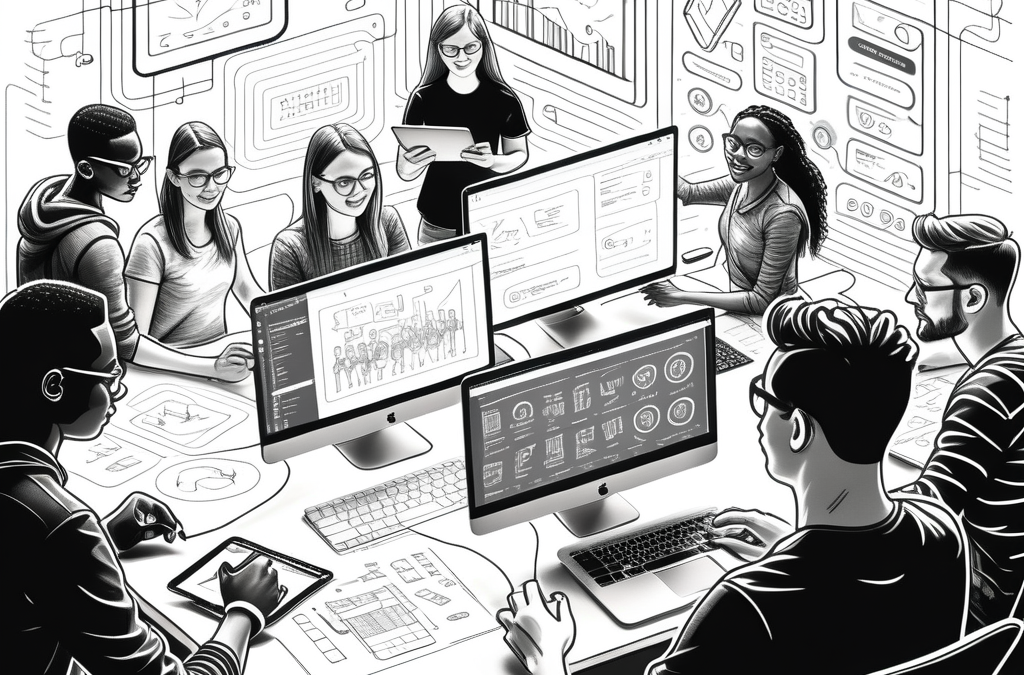Imagine a world where every app on your phone, every game you play, and every website you visit is crafted by the hands of skilled software developers. These creative minds are not just coding but are innovating solutions that transform how we live, work, and have fun. Understanding the role of a software developer is crucial for aspiring professionals and tech enthusiasts. In this article, we’ll explore the responsibilities of software developers, essential skills, career paths, tools, and their vital impact on technology.
The Magic Behind Software Development: What Developers Do
At its heart, a software developer writes code—the special language that computers understand—using various programming languages like Python, Java, and JavaScript. However, coding is just one slice of the pie. Their roles involve:
- Designing Software Solutions: Developers think creatively about how programs will look and work, ensuring user interfaces are not only functional but also enjoyable to use.
- Specializing in Different Areas:
- Front-End Developers: Focus on what users see and interact with.
- Back-End Developers: Manage server-side logic and database interactions.
- Full-Stack Developers: Handle both front-end and back-end tasks.
- Mobile Developers: Create apps specifically for smartphones and tablets.
Collaboration is key; developers often work in teams with designers and project managers, mixing ideas and skills to create high-quality software.
Essential Skill Set: Mastering the Art of Coding
To shine as a software developer, you need a unique toolkit of skills:
- Programming Languages: Master languages like Python (simple and versatile), Java (great for enterprise applications), and JavaScript (essential for web interactivity).
- Problem-Solving: Every day presents new challenges. Developing strong analytical skills and understanding algorithms and data structures help make your code efficient.
- Development Tools: Familiarity with version control systems like Git and Integrated Development Environments (IDEs) can streamline your workflow. Basic knowledge of databases (SQL and NoSQL) is also essential.
- Attention to Detail: Small mistakes can lead to significant issues, so being meticulous is crucial.
- Adaptability and Continuous Learning: The tech landscape is ever-changing. Stay updated on new trends and tools to remain competitive.
Navigating Responsibilities: A Day in the Life of a Developer
A software developer’s daily routine is a fascinating blend of planning, coding, and teamwork. Here’s how a typical day may unfold:
- Morning Planning: Review tasks and set goals for the day.
- Stand-Up Meetings: Brief team meetings to update on progress and challenges.
- Coding Sessions: Focused time for writing and refining code, tackling features, or debugging.
- Learning and Growth: Dedicate time to stay updated with the latest developments in technology, whether through online courses or reading articles.
This mix of teamwork and individual work makes each day unique and exciting.
Crafting Your Path: How to Become a Software Developer
Starting your journey as a software developer can take several paths:
- Education: While a degree in computer science is common, coding boot camps and online courses provide valuable training.
- Building a Portfolio: Work on personal projects or contribute to open-source initiatives to showcase your skills.
- Gaining Real-World Experience: Pursue internships or entry-level positions to learn the industry ropes.
- Networking: Attend meetups, join forums, or connect on LinkedIn to build relationships that could lead to job opportunities.
- Continuous Learning: Stay informed about the latest trends, tools, and technologies.
By following these steps, you can lay a solid foundation for a fulfilling career in software development.
Tools of the Trade: Technologies Every Developer Should Know
Software developers utilize various tools to create, test, and maintain applications:
- Integrated Development Environments (IDEs): Tools like Visual Studio Code and IntelliJ IDEA streamline coding with features such as code completion and debugging.
- Version Control Systems: Git is essential for tracking changes and collaborating with others.
- Cloud Computing Platforms: Familiarity with platforms like AWS, Microsoft Azure, and Google Cloud allows developers to deploy applications efficiently.
- Emerging Technologies: Knowledge of AI and machine learning can enhance career prospects in an evolving tech landscape.
Mastering these tools not only polishes your skills but also opens doors to innovative possibilities.
The Impact of Developers: Shaping Tomorrow’s Tech
Software developers are instrumental in driving innovation and change, creating solutions that tackle real-world problems. Their work impacts various sectors:
- Education: Developers build learning management systems that make online education accessible.
- Healthcare: Applications improve patient management and enhance medical outcomes.
- Entertainment: They bring engaging games and applications to life.
As technology continues to evolve, the demand for skilled developers is skyrocketing, creating exciting opportunities for those passionate about tech.
Conclusion
Software developers are the architects of our digital experiences, influencing everything from games to productivity tools. Their diverse responsibilities include coding, debugging, designing user experiences, and collaborating with teams. To excel, developers must master essential skills, embrace adaptability, and commit to continuous learning.
With the demand for skilled developers on the rise, the possibilities ahead are endless. Whether your ambition is to create the next viral app or explore groundbreaking technologies like artificial intelligence, a career in software development offers the chance to make a profound impact. Embrace the journey; you could be the visionary who shapes the future of technology!

